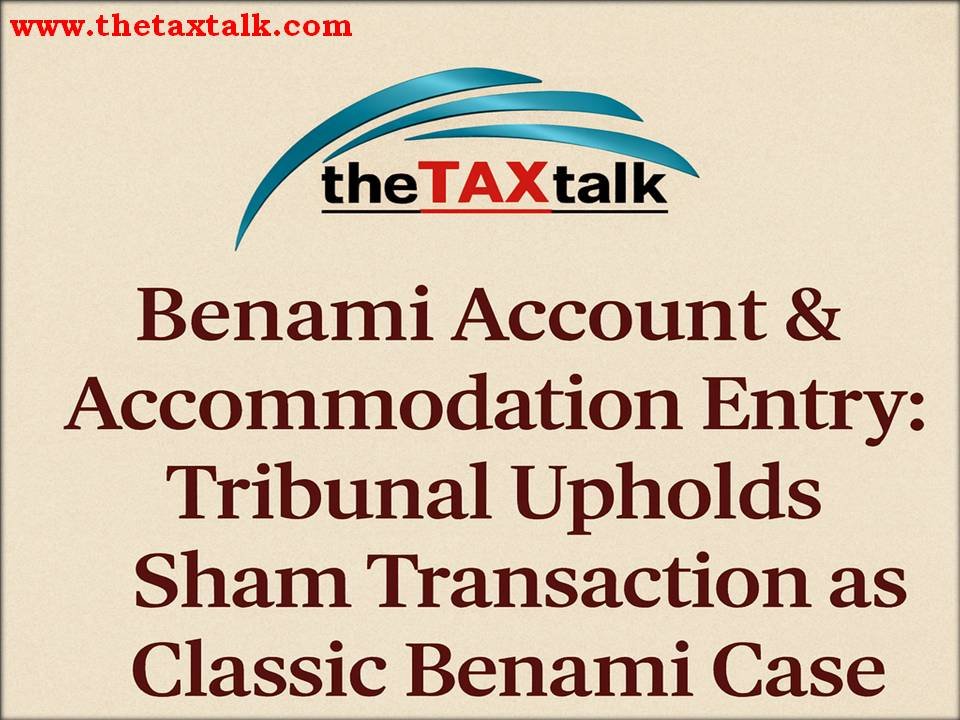![]()
Benami Account & Accommodation Entry: Tribunal Upholds Sham Transaction as Classic Benami Case
Introduction
In a significant ruling with far-reaching implications for taxpayers and businesses, the Tribunal has upheld that the use of a benami account to circularly route funds constitutes a classic case of ‘Accommodation Entry’. The ruling came in the case of Shivam Enterprises vs. Assistant Commissioner of Income-tax [2025] 176 taxmann.com 914 (SAFEMA – New Delhi), highlighting the severe consequences of using fictitious bank accounts to launder unaccounted money during the demonetisation period.
This article unpacks the facts, the ruling, and-most importantly-its practical relevance in today’s tax environment increasingly driven by AI-based data matching and forensic scrutiny.
Background of the Case
During the demonetization period, Shivam Enterprises received substantial cheque payments from a bank account held in the name of M/s Rishi Hardware (RH). This raised red flags, leading to a survey under Section 133A of the Income-tax Act at the premises of one Ashwini Kumar Kapoor (AKK).
The investigation revealed:
• RH was a fictitious entity with no ITR filings or business activity.
• The bank account was fraudulently opened using a forged PAN, an unknown individual’s photo, and falsified address documents.
• Cash deposits worth ₹45 crore were made into this RH account.
• Cheques were then issued from this account in favour of Shivam Enterprises.
• The account was operated clandestinely by AKK, using an employee named Manish Bagga.
Although the assessee (Shivam Enterprises) claimed the receipts were against genuine sales, there was no evidence of delivery of goods and the invoices were found to be fabricated.
Benami Proceedings & Tribunal’s Verdict
The case was referred under the Prohibition of Benami Property Transactions Act, 1988 (PBPTA). The Adjudicating Authority (AA) confirmed the provisional attachment under Section 24(4). The matter then proceeded before the Tribunal, which upheld the findings of the AA.
Key Findings of the Tribunal:
• The arrangement was a classic case of ‘Accommodation Entries’.
• The transaction satisfied all three limbs of Section 2(9)(A) of PBPTA:
1. The property (bank account)was in RH’s name.
2. Considerationwas provided by Shivam Enterprises.
3. The benefitof the property (funds in RH’s account) accrued to Shivam Enterprises.
• The entire setup was a sham, used for layering and concealment of true ownership.
• The Tribunal emphasized that fabrication, collusion, and misuse of identity documents nullify any arguments of genuineness.
• It rejected the plea that the case was merely an income-tax violation, holding that it fell squarely under benami law, which carries stricter consequences.
Practical Relevance: Lessons for Taxpayers & Professionals
This ruling sends a strong message to both businesses and professionals: Benami arrangements masquerading as business transactions won’t stand judicial scrutiny, especially in today’s data-integrated environment.
1. Demonetisation-Linked Transactions Under Scanner
Even years later, transactions during demonetization continue to haunt businesses. With AI-based profiling, PAN-Aadhaar linking, and CBDT’s Project Insight, the government has deep forensic capabilities to track circular transactions.
2. Fictitious Accounts = Zero Defence
Opening accounts using forged documents, even if done by an employee or third party, will be considered benami property if the real beneficiary is different. The burden of proving legitimacy is heavy and must be supported by actual delivery, logistics proof, and tax trail-not just invoices.
3. Accommodation Entries = High Risk Strategy
Receiving funds from unrelated or unverified entities, especially in a cheque-return model, will easily qualify as layered money laundering under the garb of business. If the flow of funds is artificial, the consequences can go beyond income-tax reassessment:
• Benami attachment
• Prosecution
• Disallowance of expenses
• Reversal of Input Credit under GST, if applicable
4. Income Tax vs. Benami Law: Know the Difference
Many still believe that dubious financial dealings are “just” income-tax violations. But this case reinforces that when true ownership is hidden, it becomes a benami transaction-inviting:
• Confiscation of property
• No right to recover the amount
• Imprisonment up to 7 years
5. CA/Tax Consultant’s Role Under Lens
Professionals involved in assisting in such entries can be booked for abetment, especially under Sections 53 and 54 of PBPTA. The role of chartered accountants and intermediaries is being increasingly monitored via SAR reporting, DIN system, and document trail.
Conclusion
This landmark case serves as a reminder that sham transactions with circular money flow and fictitious accounts are no longer defensible under the income-tax or benami laws. The system is rapidly becoming smarter, stricter, and digitally integrated.
If you’re involved in related party dealings, cash-based businesses, or suspicious layered funding, ensure that economic substance matches legal form. The risk of benami attachment, prosecution, and irreversible loss is just one click away for the authorities.
The copy of the order is as under:


